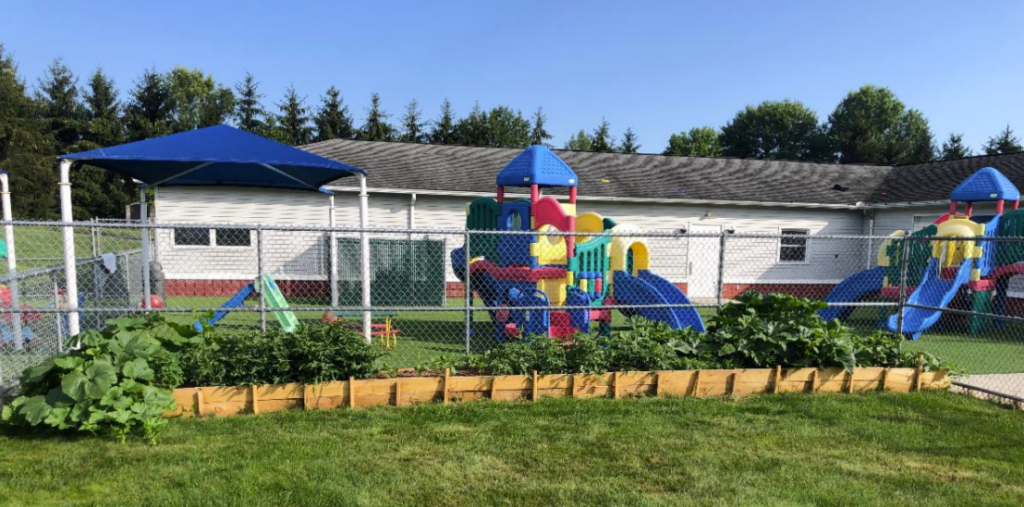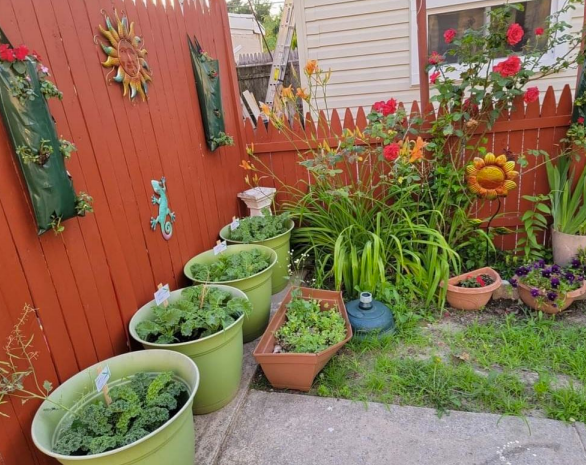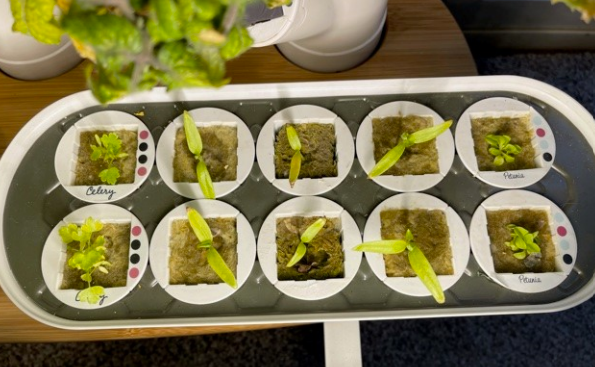There is more than one way to grow a garden!
Take a look at these amazing examples from early childcare and education (ECE) programs engaging PA’s littlest children in experiential learning through all types of gardens. These examples were curated for the PA Nutrition and Physical Activity Self-Assessment for Child Care (PA NAPSACC) newsletter. Find these stories and more on the Keystone Kids Go Website!
Garden Beds and Container Gardens
Discovery Zone Learning Center
Delaware County, PA
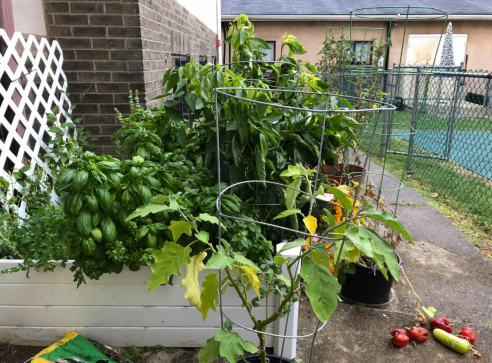 We had a small space to utilize for our garden, so raised beds were the perfect solution for us. We grew lettuce, cucumbers, squash, basil, egg plant, cherry tomatoes, peppers and flowers. The children helped with the planting of some of the seeds, then they transplanted the small seedlings to larger pots outside. They also helped water the plants and picked some of the vegetables to use for salads at lunch. One disadvantage we found was that the kids weren’t able to reach to the middle of the raised bed to be able to help later, but other than that it worked really well for our center. When we were able to share some of the harvest with our families and staff, it made us happy that we planted this tiny garden!
We had a small space to utilize for our garden, so raised beds were the perfect solution for us. We grew lettuce, cucumbers, squash, basil, egg plant, cherry tomatoes, peppers and flowers. The children helped with the planting of some of the seeds, then they transplanted the small seedlings to larger pots outside. They also helped water the plants and picked some of the vegetables to use for salads at lunch. One disadvantage we found was that the kids weren’t able to reach to the middle of the raised bed to be able to help later, but other than that it worked really well for our center. When we were able to share some of the harvest with our families and staff, it made us happy that we planted this tiny garden!
Hanover Area YMCA Early Learning Center
York County, PA
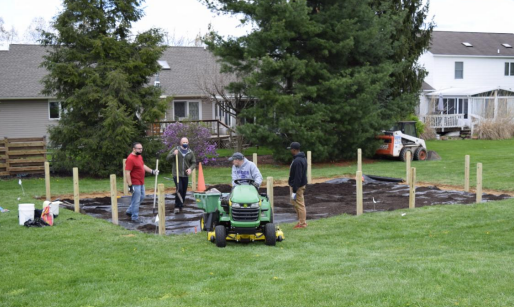 Our “Sprout Learning Garden” was a project that was completely funded and created by the York Leadership Training Program (LTP). Volunteers from LTP cleared out the area for the garden, put up fencing, built box containers and planted all of the fruits, vegetables and herbs. We grew blackberries, blueberries, raspberries, strawberries, green beans, cucumbers, peas, bell peppers, brussels sprouts, carrots, lettuce, swiss chard and sweet potatoes in our garden. In the herb containers, we had parsley, sage, thyme, rosemary and mint. The children in our Academy of Early Learning, Discovery School-Age Program and Summer Camp enjoyed watering and weeding the garden, and then picking and eating what grew.
Our “Sprout Learning Garden” was a project that was completely funded and created by the York Leadership Training Program (LTP). Volunteers from LTP cleared out the area for the garden, put up fencing, built box containers and planted all of the fruits, vegetables and herbs. We grew blackberries, blueberries, raspberries, strawberries, green beans, cucumbers, peas, bell peppers, brussels sprouts, carrots, lettuce, swiss chard and sweet potatoes in our garden. In the herb containers, we had parsley, sage, thyme, rosemary and mint. The children in our Academy of Early Learning, Discovery School-Age Program and Summer Camp enjoyed watering and weeding the garden, and then picking and eating what grew. 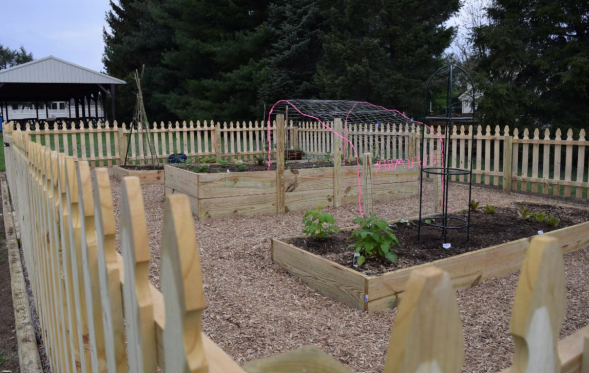
Learn-in-Play Day Care
Delaware County, PA
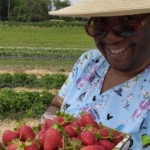 We have a flower pot garden and two garden beds. The children enjoy putting the soil in the pots, planting seeds, and watering the plants. The veteran children look forward to planting each year. We grew kale, broccoli, swiss chard, red cabbage, green peppers, red peppers, orange peppers, jalapeno peppers, cherry tomatoes, onions, rosemary, basil, parsley, thyme, sage, oregano, peppermint, spearmint, stevia, cilantro, dill, tarragon, chives, and green onions. They all like taking their harvest home and enjoy it at daycare. In addition to our garden, we visit a local orchard and farmers market a few times throughout the year, and the families love to join us for these outings. This year we picked delicious strawberries and purchased other fresh fruits and vegetables including pumpkins, apples, and other farm-grown foods. I encourage parents to buy from local growers.
We have a flower pot garden and two garden beds. The children enjoy putting the soil in the pots, planting seeds, and watering the plants. The veteran children look forward to planting each year. We grew kale, broccoli, swiss chard, red cabbage, green peppers, red peppers, orange peppers, jalapeno peppers, cherry tomatoes, onions, rosemary, basil, parsley, thyme, sage, oregano, peppermint, spearmint, stevia, cilantro, dill, tarragon, chives, and green onions. They all like taking their harvest home and enjoy it at daycare. In addition to our garden, we visit a local orchard and farmers market a few times throughout the year, and the families love to join us for these outings. This year we picked delicious strawberries and purchased other fresh fruits and vegetables including pumpkins, apples, and other farm-grown foods. I encourage parents to buy from local growers.
Trinity Cooperative Day Nursery
Delaware County, PA
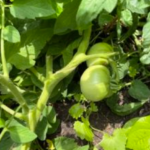 We created an outdoor garden bed. The advantages were adequate fenced-in space within our playground to create a garden and having the necessary materials/resources at hand to be able to do this. We grew green beans, tomatoes, mint, basil, pumpkins, carrots, and a failed blueberry bush! Children helped with planting, weeding, and watering. They especially loved picking the ripened veggies and taste-testing the food! Watching the children sift through the plants to find ripened beans and tomatoes was exciting. They were so proud of the results and loved washing the beans in the water fountain to taste them raw.
We created an outdoor garden bed. The advantages were adequate fenced-in space within our playground to create a garden and having the necessary materials/resources at hand to be able to do this. We grew green beans, tomatoes, mint, basil, pumpkins, carrots, and a failed blueberry bush! Children helped with planting, weeding, and watering. They especially loved picking the ripened veggies and taste-testing the food! Watching the children sift through the plants to find ripened beans and tomatoes was exciting. They were so proud of the results and loved washing the beans in the water fountain to taste them raw. 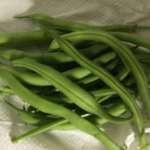 We were able to have some of the beans cooked and served along side our pasta at lunch, too! The garden often grew out of control, and since we are still remaining in our classroom pods for outdoor time, we are somewhat limited for the amount of time we could spend outside, tending to the garden, so maintenance time is something to be sure to consider when starting up and managing a garden. It is worth it for that “Farm to Table” experience for the kids!
We were able to have some of the beans cooked and served along side our pasta at lunch, too! The garden often grew out of control, and since we are still remaining in our classroom pods for outdoor time, we are somewhat limited for the amount of time we could spend outside, tending to the garden, so maintenance time is something to be sure to consider when starting up and managing a garden. It is worth it for that “Farm to Table” experience for the kids!
State College KinderCare
Centre County, PA
We built raised bed gardens outside alongside the fence of our playground. We purchased the lumber at Lowe’s and had the sod/compost mix delivered. The children planted seeds in the rooms and then transferred them to the garden. The classrooms take turns tending to the garden by weeding and watering. We grow green beans, carrots, yellow squash, zucchini, peppers, four kinds of tomatoes, and pumpkins! Our chef did a great job of cooking the vegetables and having the children help harvest them and our parents also enjoyed the over abundance of tomatoes, green beans and squash.
Edible Gardens
Kenney’s Latchkey
Dauphin County, PA
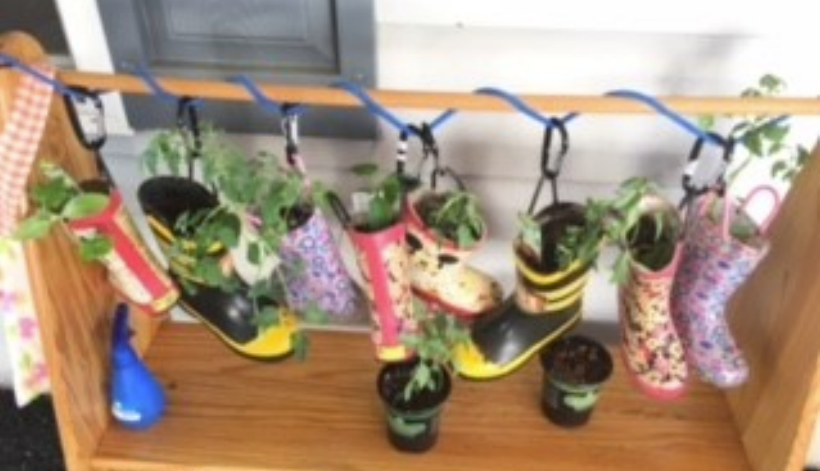 We created a pizza and salad garden and used child-size boots to contain the plants, which were very kid-friendly. They had easy access, and watered them as though they were house plants. We grew vegetables that we could use in making pizza and salad. Our garden had lettuces, herbs, tomatoes, cucumbers, and peppers. The children were involved from the beginning to the end. Each child had a choice of what boot they wanted to use. After an adult placed small drain holes in the boot, the students went on a search for old cardboard and stones to line the bottom of the boot. They filled the boot with soil, using a kid-sized shovel. Plants were added and students were responsible for watering when needed. It was amazing to see the happy faces when the tomatoes appeared and I was glad when the children were able to see the reward of their labor. They were able to eat the food and use the produce for our class pizza and salad lunch.
We created a pizza and salad garden and used child-size boots to contain the plants, which were very kid-friendly. They had easy access, and watered them as though they were house plants. We grew vegetables that we could use in making pizza and salad. Our garden had lettuces, herbs, tomatoes, cucumbers, and peppers. The children were involved from the beginning to the end. Each child had a choice of what boot they wanted to use. After an adult placed small drain holes in the boot, the students went on a search for old cardboard and stones to line the bottom of the boot. They filled the boot with soil, using a kid-sized shovel. Plants were added and students were responsible for watering when needed. It was amazing to see the happy faces when the tomatoes appeared and I was glad when the children were able to see the reward of their labor. They were able to eat the food and use the produce for our class pizza and salad lunch.
Hydroponic and AeroGardens
The Art of Play Early Learning Center
Cumberland County, PA
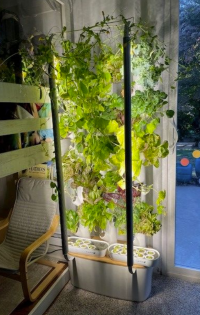 We chose to invest in a hydroponics system to grow fresh fruits and veggies all year long. We grew butterhead lettuce, arugula, basil, dill, mint, mini strawberries, sweet peppers, jalapeños, kale, cherry tomato, mini eggplant, green, mustard, strawberries, kale, tatsoi, red sails lettuce, sweet basil, peas, thyme, cardinal, monte carol, red mustard, rouge d’hiver, swiss chard, and more! The children learned about how bees are vital for plant and human life because of their ability to pollinate plants. Since we don’t have bees inside we use an electric toothbrush to pollinate the plants ourselves. We’ve also learned about root systems because our hydroponics system gives us a unique ability to view the roots of the plants. The children and I learned that cucumber roots smell exactly like a freshly cut cucumber. The children’s favorite part of our project is helping with weekly harvests and taste testing our fruits and veggies. We loved this project so much and it’s such a success that we decided to get a second one so we can grow more peppers and tomatoes for the kid’s salads and snacks and are planning to move some of the plants outside during the spring season.
We chose to invest in a hydroponics system to grow fresh fruits and veggies all year long. We grew butterhead lettuce, arugula, basil, dill, mint, mini strawberries, sweet peppers, jalapeños, kale, cherry tomato, mini eggplant, green, mustard, strawberries, kale, tatsoi, red sails lettuce, sweet basil, peas, thyme, cardinal, monte carol, red mustard, rouge d’hiver, swiss chard, and more! The children learned about how bees are vital for plant and human life because of their ability to pollinate plants. Since we don’t have bees inside we use an electric toothbrush to pollinate the plants ourselves. We’ve also learned about root systems because our hydroponics system gives us a unique ability to view the roots of the plants. The children and I learned that cucumber roots smell exactly like a freshly cut cucumber. The children’s favorite part of our project is helping with weekly harvests and taste testing our fruits and veggies. We loved this project so much and it’s such a success that we decided to get a second one so we can grow more peppers and tomatoes for the kid’s salads and snacks and are planning to move some of the plants outside during the spring season.
Brown’s Family Childcare, LLC
Venango County, PA
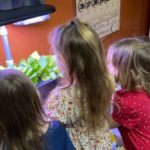 In our garden we grew tomatoes, herbs including dill, parsley, mint, thyme and basil, salad greens including black seed simpson, deer tongue, parris island, red sails, marvel of four seasons and rouge d’Hirer, and 4 varieties of wild flowers! Children were involved by helping place pods in the AeroGarden, adding water when needed, documenting the growth, harvesting produce when ready and helping to cook with the produce. Within a few days of setting up the AeroGarden, we started seeing seedlings! All of my preschoolers love watching the progress of our plants. One morning a 3-year-old girl shouted, “You grew while I was at my home! I was thinking about you growing and you did!!”
In our garden we grew tomatoes, herbs including dill, parsley, mint, thyme and basil, salad greens including black seed simpson, deer tongue, parris island, red sails, marvel of four seasons and rouge d’Hirer, and 4 varieties of wild flowers! Children were involved by helping place pods in the AeroGarden, adding water when needed, documenting the growth, harvesting produce when ready and helping to cook with the produce. Within a few days of setting up the AeroGarden, we started seeing seedlings! All of my preschoolers love watching the progress of our plants. One morning a 3-year-old girl shouted, “You grew while I was at my home! I was thinking about you growing and you did!!” 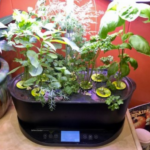 That is evidence that children are learning and thinking about gardening! Although there are some challenges to setting up an indoor garden, including that some plants are toxic to children such as tomatoes. When we grow tomatoes, I put the AeroGarden in another room and show the children photos. Start up costs can also be a challenge, and the AeroGarden uses electric, so may result in a higher electric bill. However, bringing nature inside to the classroom, growing our own produce, maintaining the indoor garden after it’s set up, and the educational experience it provides for kids is worth it!
That is evidence that children are learning and thinking about gardening! Although there are some challenges to setting up an indoor garden, including that some plants are toxic to children such as tomatoes. When we grow tomatoes, I put the AeroGarden in another room and show the children photos. Start up costs can also be a challenge, and the AeroGarden uses electric, so may result in a higher electric bill. However, bringing nature inside to the classroom, growing our own produce, maintaining the indoor garden after it’s set up, and the educational experience it provides for kids is worth it!



